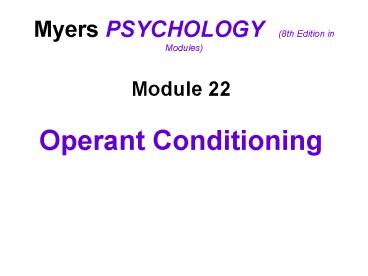Myers PSYCHOLOGY 8th Edition in Modules - PowerPoint PPT Presentation
1 / 25
Title:
Myers PSYCHOLOGY 8th Edition in Modules
Description:
Organisms learn associations between particular behaviors (as opposed to ... Operant conditioning involves learning to choose to engage in certain behaviors ... – PowerPoint PPT presentation
Number of Views:64
Avg rating:3.0/5.0
Title: Myers PSYCHOLOGY 8th Edition in Modules
1
Myers PSYCHOLOGY (8th Edition in Modules)
- Module 22
- Operant Conditioning
2
Operant Conditioning
- Organisms learn associations between particular
behaviors (as opposed to particular stimuli in
classical conditioning) and consequences.
Behaviors are voluntary and elicited from the
organism. - Operant conditioning involves learning to choose
to engage in certain behaviors in order to
receive rewards or avoid consequences. - Operant a response that has some effect on the
world.
3
Thorndikes Law of Effect
- If a response made in the presence of a
particular stimulus is rewarded, the response is
more likely to occur the next time the stimulus
is encountered again. - Instrumental Conditioning
- Skinner extended this idea by saying that an
organism learns a response by operating on the
environment. - Operant Conditioning
4
Operant Conditioning
- Respondent Behavior
- occurs as an automatic response to stimulus
- behavior learned through classical conditioning
- Operant Behavior
- operates (acts) on environment
- produces consequences
5
Operant Conditioning
- B.F. Skinner (1904-1990)
- elaborated Thorndikes Law of Effect
- developed behavioral technology
6
Operant Chamber
- Skinner Box
- chamber with a bar or key that an animal
manipulates to obtain a food or water reinforcer - contains devices to record responses
7
Operant Conditioning
- Reinforcer
- any event that strengthens the behavior it
follows - Shaping
- operant conditioning procedure in which
reinforcers guide behavior toward closer
approximations of a desired goal
8
Reinforcement
- Reinforcement Always encourages behavior or
makes behavior more likely. - Positive reinforcement Giving something good to
encourage behavior - Negative reinforcement Taking away something
bad in order to encourage behavior - NOTE Both positive AND negative reinforcement
are GOOD things the learner hopes to receive.
9
Punishment
- Punishment Always discourages behavior or makes
behavior less likely. - Positive Punishment Giving something bad to
discourage behavior. - Negative punishment Taking away something good
to discourage behavior. - NOTE Both positive AND negative punishments are
BAD things the learner hopes to avoid.
10
When Dr. Piercys daughter will not stop
tormenting her little sister, Dr. Piercy puts her
daughters doll in jail so that she cannot play
with it for a while. This is an example of
- Negative reinforcement
- Positive reinforcement
- Negative punishment
- Positive punishment
11
During Biffs annual review, his boss says hes
not sure whether he should give Biff a positive
punishment, or a negative reinforcement. Which
should Biff ask for?
- The positive punishment is nicer.
- The negative reinforcement is nicer.
- Biff should beg his boss to give him both the
positive punishment and the negative
reinforcement. - Biff should beg his boss not to give him the
negative reinforcement or the positive punishment.
12
Operant Conditioning
13
Principles of Reinforcement
- Reinforcer
- any event that strengthens the behavior it
follows - Primary Reinforcer
- innately reinforcing stimulus
- i.e., satisfies a biological need
- Conditioned Reinforcer
- stimulus that gains its reinforcing power through
its association with primary reinforcer - secondary reinforcer
14
Schedules of Reinforcement
- Continuous Reinforcement
- reinforcing the desired response each time it
occurs - Partial (Intermittent) Reinforcement
- reinforcing a response only part of the time
- results in slower acquisition
- greater resistance to extinction
15
Schedules of Reinforcement
- Fixed Ratio (FR) Schedule
- reinforces a response only after a specified
number of responses - faster you respond the more rewards you get
- different ratios
- very high rate of responding
- like piecework pay
16
Schedules of Reinforcement
- Variable Ratio (VR)
- reinforces a response after an unpredictable
number of responses - average ratios
- like gambling, fishing
- very hard to extinguish because of
unpredictability
17
Schedules of Reinforcement
- Fixed Interval (FI)
- reinforces a response only after a specified time
has elapsed - response occurs more frequently as the
anticipated time for reward draws near
18
Schedules of Reinforcement
- Variable Interval (VI)
- reinforces a response at unpredictable time
intervals - produces slow steady responding
- like pop quiz
19
Schedules of Reinforcement
20
Luke gets paid 1,000 for every four pianos he
tunes. He is on a _________ schedule of
reinforcement.
- A. fixed interval
- B. fixed ratio
- C. variable interval
- D. variable ratio
21
Extinction occurs ___________ in classical
conditioning and ___________ in operant
conditioning.
- A. when the CS is presented with the US when
reinforcement increases - B. when the CS is presented alone repeatedly
when reinforcement increases - C. when the CS is presented alone repeatedly
when reinforcement stops - D. when the CS is presented with the US when
reinforcement stops
22
Punishment
23
Operant vs Classical Conditioning
24
Cognition and Operant Conditioning
- Cognitive Map
- mental representation of the layout of ones
environment - Example after exploring a maze, rats act as if
they have learned a cognitive map of it - Latent Learning
- learning that occurs, but is not apparent until
there is an incentive to demonstrate it
25
Cognition and Operant Conditioning
- Intrinsic Motivation
- desire to perform a behavior for its own sake and
to be effective - Extrinsic Motivation
- desire to perform a behavior due to promised
rewards or threats of punishments































